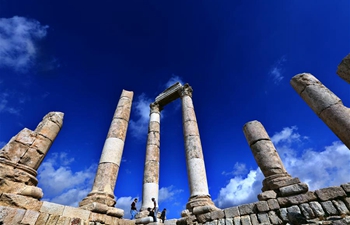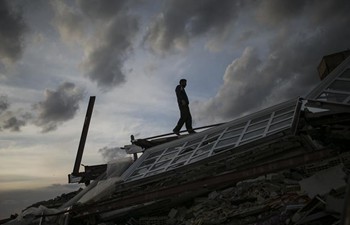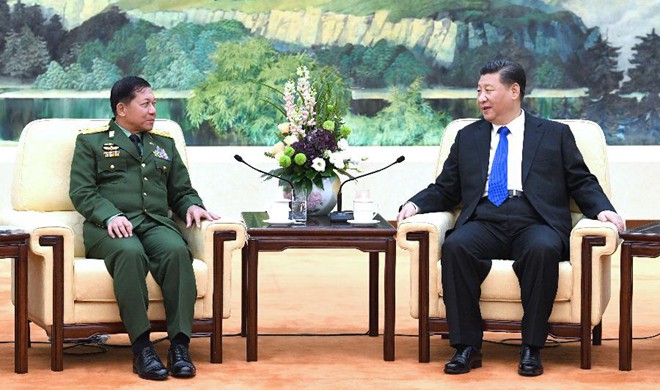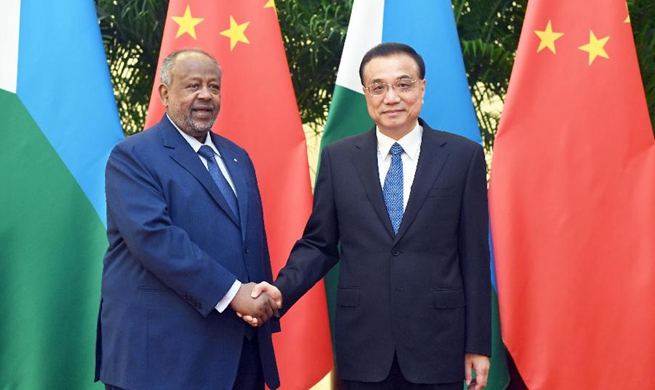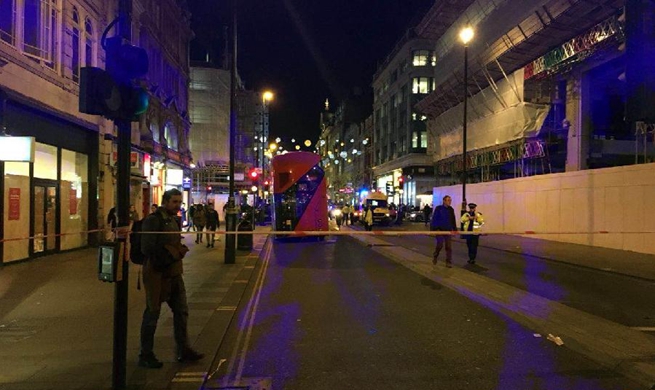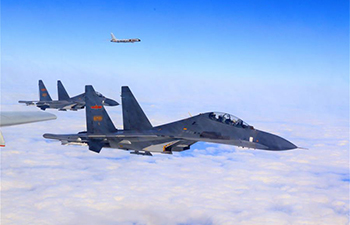by Mahmoud Fouly
CAIRO, Nov. 24 (Xinhua) -- The deadly terrorist attack against a mosque in Egypt's North Sinai Province on Friday indicates the randomness, confusion and weakness of terrorists in Egypt who started to target fellow Muslims for the first time in the country's modern history, said Egyptian political and security experts.
On Friday noon, when Muslims gathered at mosques for massive prayers, at least 235 worshippers were killed and over 100 others wounded in a bombing and gunfire attack against a mosque in a small village in North Sinai Province bordering Israel and the Palestinian Gaza Strip.
Diaa Rashwan, head of Egypt's State Information Service and chief of Cairo-based Al-Ahram Center for Political and Strategic Studies, said in a statement that the attack, despite its bloodiness and unprecedented extremism, reflects "the beginning of weakening" of the affiliates of the Islamic State (IS) regional terrorist group which started to use "soft targets" due to their failure in the face of security confrontations.
Terror attacks started to rise in Egypt following the military ouster of former Islamist President Mohamed Morsi in July 2013 in response to mass protests against his one-year rule and his currently outlawed Muslim Brotherhood group.
Since then, most of the attacks focused on restive North Sinai and killed hundreds of policemen and soldiers, before they later started to extend to other provinces and target the Coptic minority in their churches.
Now they started to target the Muslim worshipers at mosques for the first time, which is an unprecedented development in terrorist tactics in the country.
Fingers are pointed at a Sinai-based group loyal to the IS, which has claimed most of the large terrorist operations in Egypt over the past few years and whose affiliates are currently facing massive security crackdown in Syria and Iraq.
"I believe that Sinai mosque attack shows randomness, confusion and the beginning of the end of terrorists in Egypt. They never targeted Muslims in the mosques before during the massive Friday prayers, which is a serious change that does not even comply with their announced goals," Mohamed Kashkoush, professor of national security at Nasser Supreme Military Academy, told Xinhua.
He said the security crackdown on the IS in Syria, Iraq and Libya affected their affiliate group in North Sinai, which has been suffering besiege and shrinking sources of finance due to the current good relations between Egypt and the Gaza Strip.
"The operation shows their tactical bankruptcy that led them to resort to random terrorism with the purpose of horrifying the people," Kashkoush added, stressing that targeting a Muslim place of worship shows that these terrorists have nothing to do with Islam nor do they have an Islamic cause to fight for even if they claim otherwise.
Over the past few years, the Egyptian military in cooperation with the police killed hundreds of terrorists and arrested a similar number of suspects as part of the country's anti-terror war declared by President Abdel-Fattah al-Sisi, the army chief then, following Morsi's ouster.
President Sisi said in a televised speech Friday evening that "this mean, sinful terrorist attack will only increase our strength, resolution and unity in our fight against terrorism," vowing "we will respond fiercely against this minor group of extremists and terrorists."
The Egyptian president received phone calls on Friday from U.S. President Donald Trump, French President Emmanuel Macron and others who offered their condolences over the tragic attack and voiced their support for the North African country in its war against terrorism. The attack was also condemned by many leaders and foreign ministries across the world as well as regional and international organizations.
For his part, Khaled Okasha, director of the National Center for Security Studies, described the attack as an "unprecedented operation with a very high degree of wildness that surpassed all the limits of terrorist groups."
"It's one of the largest operations that took place in Egypt, with some terrorist elements using bombs, some opening fire and others besieging the area, with the purpose of causing the largest number of casualties and not merely committing a symbolic operation," said the security expert, noting that the attack is meant to spread terror among Egyptians.
Okashsa, however, is not for the opinion that the anti-mosque attack signals randomness and confusion of terrorist groups in the Sinai Peninsula since it could achieve its goals.
According to many experts, Friday's tragedy is an evident proof that the terrorist groups, mostly the Sinai-based IS affiliates, change their strategy from confrontations with the Egyptian armed forces and police to direct confrontations with the Egyptian people regardless of their religions.
Experts also expect strong security campaigns in response to the attack to maintain the country's anti-terror war, to show the state's ability to preserve its security and stability and to absorb the anger of the Sinai people that could lead to armed clashes between them and terrorist groups.
"The bloody terrorist attack on a mosque at a small village in North Sinai shows an obviously deviant ideology of such terrorists," said security expert and retired general Salah Samak.
He ruled out the possibility of a rising ideological disagreement among IS group members in Sinai that led to the rare mosque attack.
"Due to Egypt's political and economic success, the terrorists try hard to give an impression of the country's instability by such a hopeless attack against armless civilian targets," Samak told Xinhua, noting that it also indicates the terrorists' failure in challenging security confrontations.




